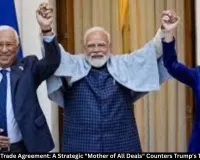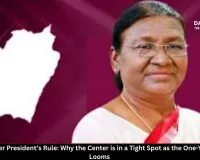India's Cough Syrup Crisis 2025: Why Regulatory Failures Are Killing Our Children
Digital Desk
.jpg)
In the heart of India, a silent killer lurks in medicine cabinets – contaminated cough syrup. As of October 2025, the tragic deaths of 17 children in Madhya Pradesh from a Tamil Nadu-made syrup called Coldrif have exposed the rotting core of our drug regulation system. This isn't just a one-off accident; it's a symptom of chronic neglect that's been brewing for years. How many more innocent lives must we lose before we demand real change?
Let's break it down simply. The syrup, meant to soothe coughs, instead caused renal failure, leading to 14 deaths in Chhindwara district alone. Another 11 kids in Madhya Pradesh and Rajasthan fell victim earlier. Authorities quickly sealed the supplier's office in Jabalpur and banned the product in Tamil Nadu. A special investigation team (SIT) is probing, and the Central Drugs Standard Control Organisation (CDSCO) promises action. But is this enough? In my opinion, it's like putting a band-aid on a gaping wound.
The real crisis? Our regulatory bodies are crippled. Over 60% of drug inspector posts are vacant nationwide. The CDSCO runs at 40% staff shortage for over a decade. States like Tamil Nadu have no head for their drug control since June 2025, with key positions empty. Testing labs sit idle – Uttarakhand tested just 226 samples in years when they could do 750 annually. Corruption, poor infrastructure, and outdated facilities let substandard drugs slip through. Remember the 2003 Mashelkar Committee? It called for better setup, but most states ignored it.
This isn't new. Past scandals, like the 2019 reports on underused labs, show we've known the problems. Experts like Dr. D Roy warn the crisis is "looming but we're failing to react." Parliamentary committees highlight vacancies as a "national concern," yet only 49 posts filled last year out of hundreds needed. Overworked inspectors can't monitor thousands of units properly. Result? Adulterated medicines flood markets, risking public health.
What does this mean for you and me? As parents, how safe are the medicines we give our kids? In a country boasting world-class pharma exports, why do our own people suffer from toxic fakes? It's a betrayal of trust. The Modi government talks big on health, but where's the action on staffing and anti-corruption?
In my view, we need urgent reforms: Fill vacancies immediately, modernize labs, and impose strict penalties on errant firms. Public awareness campaigns could help – spot fake drugs by checking batch numbers online. Doctors in Madhya Pradesh are protesting arrests in the probe; instead, let's unite for systemic fixes.
This tragedy could be a turning point. Imagine an India where every pill is safe, not a gamble. But it starts with us demanding accountability. What do you think – is it time for a national drug safety overhaul? Share your thoughts below. Until then, the cough syrup crisis 2025 reminds us: Neglect costs lives.











